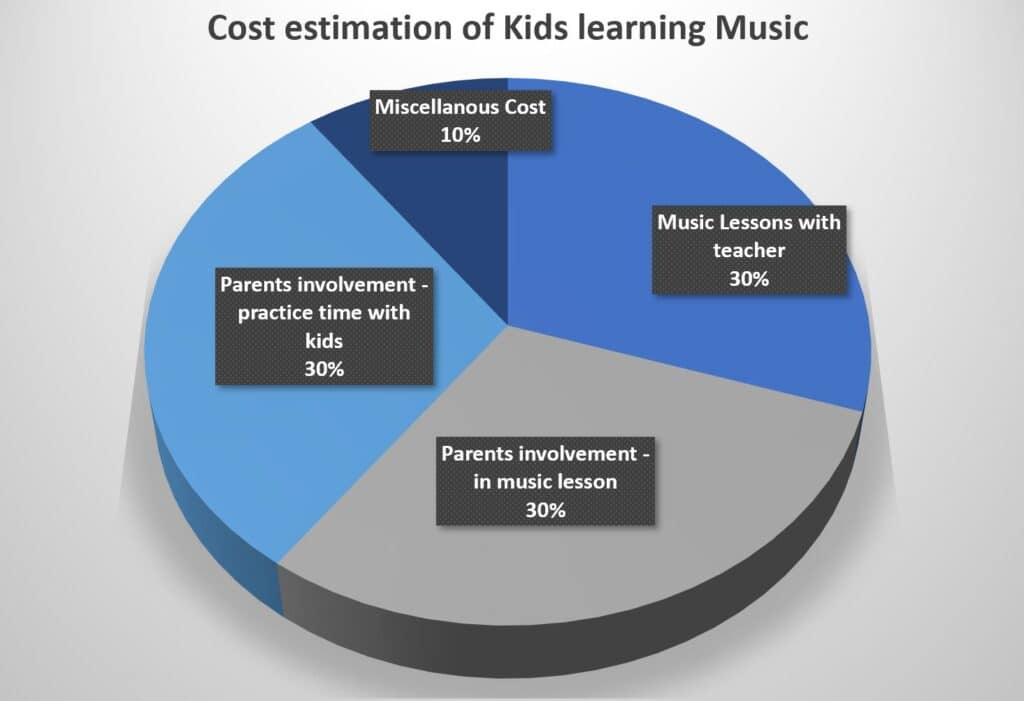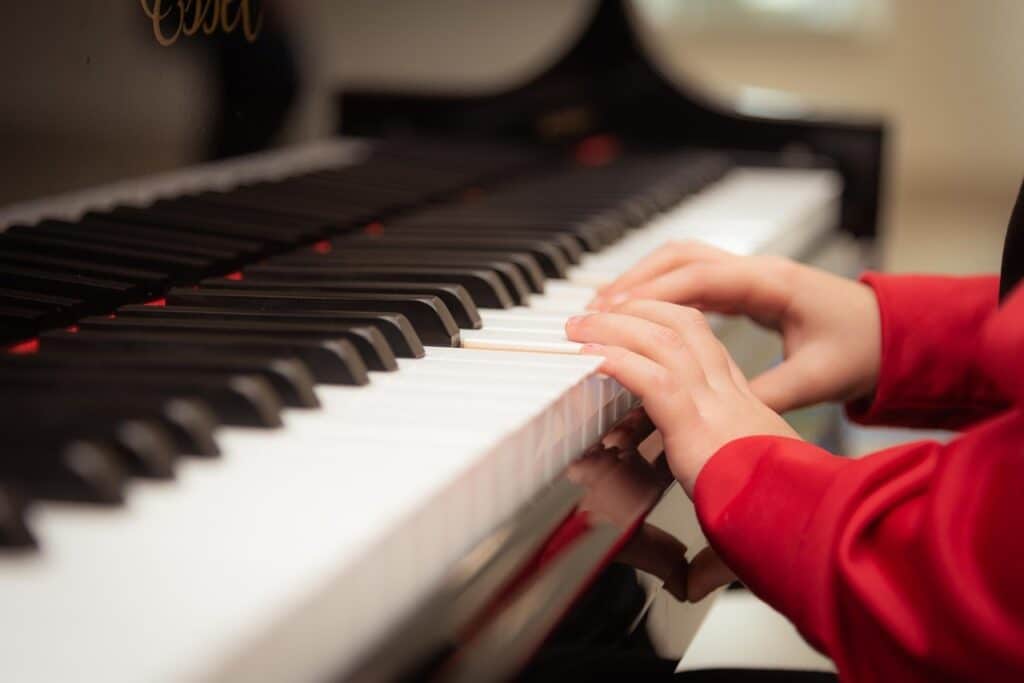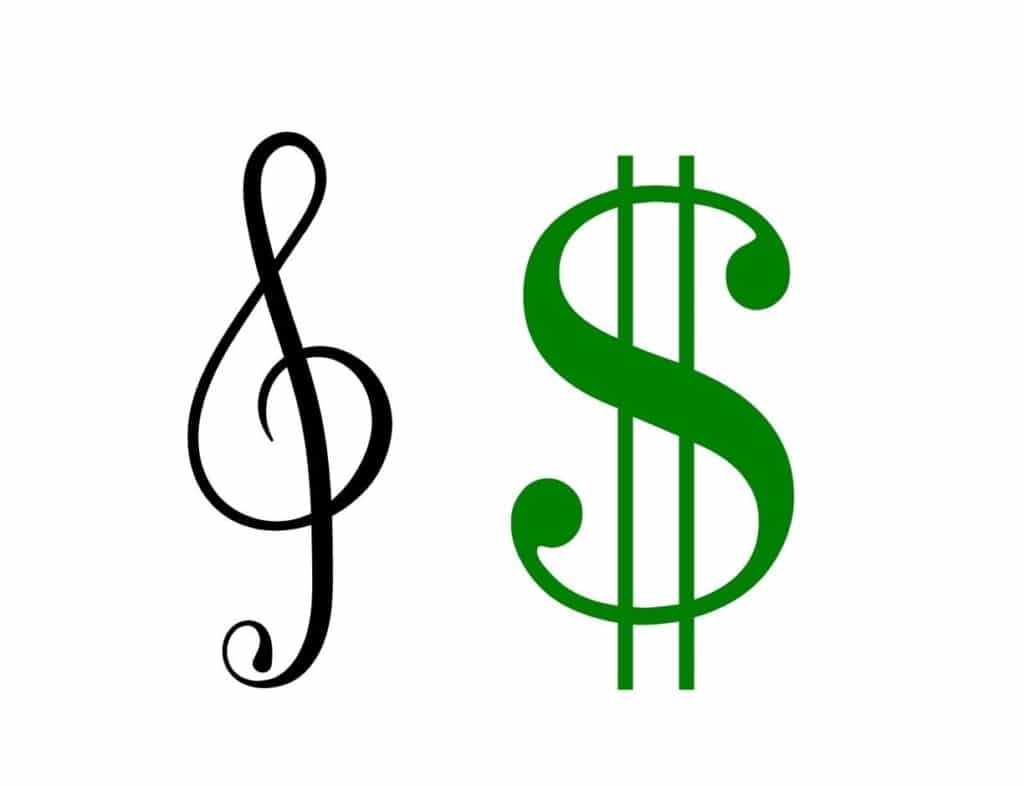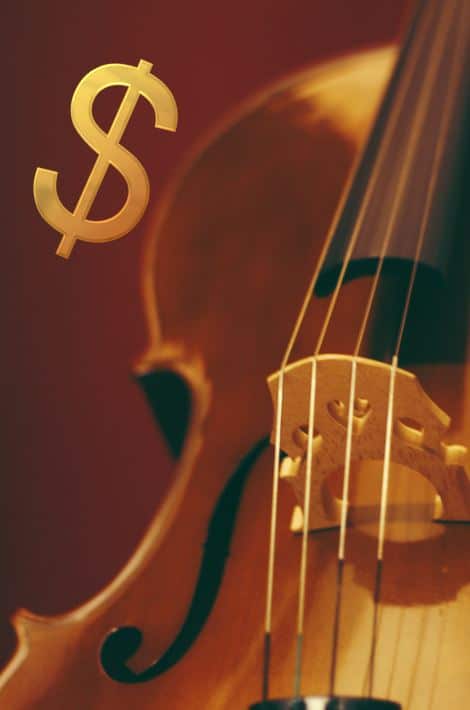We all know that musical instrument study can be benefit for kids in various ways, such as boost in children’s brain development, improvements in memory, focus, and concentration in adulthood. However, committed to learn one musical instrument not an easy decision, including the time and cost investment. Today let’s have a look on the cost of learning music before we looking for a music teacher or school.
Table of Contents
Cost Factors of Music Lessons
For most parents, this is a critical consideration. Nobody wants to spend a lot of money on an music instrument that their child will abandon shortly. If we speaking about the cost of learning music, most parents is directly related with music lessons. However, it is only a small part of the whole effort and cost. Take myself as an example, both of my kids learn flute (6 and 7 year old). Take one kid as example, I need to drive him to music school (7 miles away in the city center) twice per week, spend time in the lessons or wait outside (1 hour), practice with him at home (3 hour per week), maintenance cost of instrument, concert clothes etc. Moreover, all the emotional support to kids to motivate them and help them to achieve. All in all, Rome was not built in a day.
I listed the cost overview as below. Let’s go through it. Hopefully my experience will give you a rough idea and with some cost reduction tips!

1. Musical Lesson Cost
You can take music lessons from either music schools or private instructors, undergo an entire training program or customize to your schedule and learning curve. And all of these are part of the factors that affect its price. Generally speaking, the cost of music lessons in the US ranges from $30 – $45 for a 30-minute lesson. This price is mostly regardless of which instrument.
Group Lesson or Private Lesson?
Private lessons guarantee your kids get fully attention from the teacher and the learning curve is adjust to you 100%. If the teacher’s learning style fits this set-up, your success rate in learning is higher. You can take the private lesson at home or at the teacher’s place. However, most experienced teachers are quite busy and prefer to choose their place.
Joining group music lessons is more affordable since the instructor can conduct the lesson with more attendees at once. Each participant can take part in the instructor’s hourly rate, which makes it cheaper. Group lessons are often taken in music schools, they conduct a rigorous hiring process for their instructors. This assures you can learn only from credible and skilled teachers. Moreover, music school also offers replacement if a teacher cannot make the lessons. Their lessons are also more structured to keep you engaged during and successful after the program.
I strongly suggest to take group lessons when your kids are young. They are not adapt to analytically, theoretically, or technically learn music. Rather in a natural and fun way to enjoy music by singing and playing music. By taking group lessons, kids can play together and inspire music together, especially with different culture background. When the your kids are older and they may fit more for the one on one study.
Buy or Rent Musical Instrument?
The musical instrument price has a large range from less than 10$ or thousands dollar. Don’t spend a lot of money on your child’s first instrument (if it’s expensive) unless they proved to stick with it. Thus, it is best to either rent, or if the music school offers, or buy a second hand one. Once your child is committed to further learning, you can start investing in it.
Experience Teacher or Certified Teacher?
The instructor’s credentials can significantly impact the cost of the music lessons. A reputable instructor is more expensive than those who do not have a name yet in the industry. But then, working with a known instructor does not entirely guarantee success. Some instructors may not have a degree, but their passion and natural talent may have pushed them to their careers.
In my opinion, both degree and experience are important, but not as important as the teacher’s interaction with kids to inspire them.

2. Parents involvement
With or without musical experience, many parents wonder whether they should assist their children in practicing. How much communication is appropriate with the teacher? Whether they should assist with written assignments? and how much about music they should strive to learn themselves?. In the early education, parents play an important role! So, what are the parents involvement?
Commute
If you are commute to teacher’s studio or music school, either on non-working hours or working hours, it can be a headache while you stuck in a traffic, need to leave while you are working, or find a parking place.
My tips are: 1. Plan the course in advance and take the most comfortable time slot for you. Make sure that kids have a few hours free time before the music lesson. You can use the time for last minute practice or purely rest. Do not arrange sports before the music lesson. 2. Prepare everything in one bag, with books, instrument, water, assignment books etc.
In Lesson
Are you also join the lesson? Enjoying the music play and take notes? Yes!
Parents work together ensures that the child remains motivated and eager to do things correctly. It instills confidence in them, and they develop a useful “can-do” attitude. They frequently say things like “Yes, I did it!” This is how you get kids interested in practicing as much as they love the idea of having lessons.
Another benefits of parents joining the lesson is to know the progress, able to find materials, record the difficult part, refer to lesson notes, and know where the homework is. It is helpful to understand which section are your kids struggle with and easy to tackle it.
Communication with the music teacher is crucial in assisting children’s musical development. Even a few minutes before or after a lesson to discuss with the teacher what went well and what didn’t can help any parent at home.
Practice with Kids
Young children may lack the self-discipline required to practice an instrument on their own. Many young kids will simply sit down to play old songs that are now too easy for them to “fill” their practice time while their parents believe they are actually practicing! Parents can make a significant difference by involving themselves to ensure the quality practice. The activities including positively encouraging, reminding, and setting up regular practice schedule. This way, practice became a routine for the kids. Children who are left alone with music and play around during practice time may not develop the correct skills. Parental structure and involvement are essential for progress and success.
3. Miscellaneous Cost
Other occasional costs are including:
- Instrument maintenance such as replacement of strings, tune piano sound
- Books and other materials
- Summer camp fee
- Clothes and tickets for recital and all other coming up cost
- These part of cost is depends on parents preference.
Tips for Cost Reduction Learning Music
If you are on the budget, let it not hinder you from pushing through with your passion or developing your talent. Here are some budget tips for you:
Encourage kids all the time
Children learn better when they are taught something with enthusiasm. Your child will be more inclined to learn a musical instrument if you present it as an adventure rather than an imposition. Look for creative ways to portray the instrument act ecstatic about the prospect of the two of you playing together. Always listen to your kids, find out what motivate them and encourage them all the way. Ultimately, if they learn fast and spontaneously, it helps you to reduce a lot of the cost of learning music,
Research for scholarship offers
If you or your child are naturally gifted, you may qualify for scholarships to reduce the cost of learning music. This may also open more opportunities for you, like exposure to local and international competitions.

Conclusion
Engaging in music lessons is a wonderful use of your children’s extra time, the same goes for parents who have shelved a long-time passion for their kids. The cost of learning music is not only associated with money, but also time and energy.
For young children, parents involvement in lessons and practice are essential and it consume lots of time and energy in the beginning. They can help kids to develop good habits such as persistency and time management. These capabilities are easily transfer to other areas such as sports or academia study. Within time, your children will develop independence and motivation to practice on their own to understanding that hard work pays off. They will reach their full musical potential!
About Me
Hi, there. I am Lin. Together with my husband and two kids, we live in the beautiful Netherlands in Europe. I am dedicated to self-development, creating quality time for the whole family, and fully supporting kids with their potentials and possibilities with all I have learned from engineering, MBA, and 10+ years of working experience in the energy sector.



1 Comment
Comments are closed.